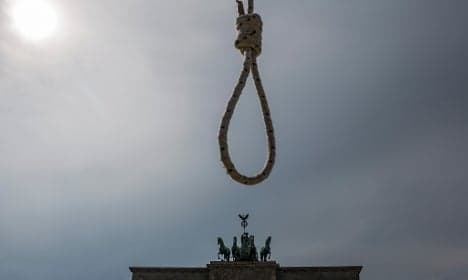German state to finally get rid of death penalty

The central state of Hesse is overhauling their constitution, making sure to get rid of one thing in particular that no other state has: the death penalty.
In the wake of the Second World War, Germany wrote a new Constitution with reforms intended to shake off its violent Nazi past, including to clearly define where the country newly stood on the death penalty.
"Capital punishment is abolished," states Article 102 simply, with no further explanation.
The Constitution, or Grundgesetz, was signed in 1949, but just three years before, the state of Hesse apparently had its own ideas about capital punishment.
"For especially severe crimes, the sentence can be death," dictates Article 21 of Hesse's state constitution, written in 1946.
Now, 70 years later, Hesse is at last working to clear up this inconsistency.
When the Grundgesetz was approved, it immediately superseded the state law, thus making Article 21 essentially irrelevant. Even during the three years in between those legal documents being signed, capital punishment was never exercised in Hesse, though it was used in other parts of the country, according to Tagesspiegel.
Hesse's state legislators met this week to discuss reforming the constitution, which would also include changes like lowering the minimum age of voting in state elections from 21 to 18 - something else unusual to Hesse.
The last time Hesse attempted to negotiate a similar major constitutional reform, which included changing the death penalty, was between 2003 and 2005, Hesse parliament spokeswoman Carola May told The Local.
"A parliamentary committee tried to strike or reform certain constitutional articles with new, modern rules," May explained.
But the various parties could not agree on the proposed changes. The death penalty remained.
To finalize the reform, Hesse will have to put forth a referendum to the people.
In Europe, only Belarus maintains the death penalty in both law and practice, while 102 countries worldwide have abolished it.
In a surprising survey two years ago, a law professor in Bavaria found that one-third of his students and aspiring lawyers supported the death penalty.
Comments
See Also
In the wake of the Second World War, Germany wrote a new Constitution with reforms intended to shake off its violent Nazi past, including to clearly define where the country newly stood on the death penalty.
"Capital punishment is abolished," states Article 102 simply, with no further explanation.
The Constitution, or Grundgesetz, was signed in 1949, but just three years before, the state of Hesse apparently had its own ideas about capital punishment.
"For especially severe crimes, the sentence can be death," dictates Article 21 of Hesse's state constitution, written in 1946.
Now, 70 years later, Hesse is at last working to clear up this inconsistency.
When the Grundgesetz was approved, it immediately superseded the state law, thus making Article 21 essentially irrelevant. Even during the three years in between those legal documents being signed, capital punishment was never exercised in Hesse, though it was used in other parts of the country, according to Tagesspiegel.
Hesse's state legislators met this week to discuss reforming the constitution, which would also include changes like lowering the minimum age of voting in state elections from 21 to 18 - something else unusual to Hesse.
The last time Hesse attempted to negotiate a similar major constitutional reform, which included changing the death penalty, was between 2003 and 2005, Hesse parliament spokeswoman Carola May told The Local.
"A parliamentary committee tried to strike or reform certain constitutional articles with new, modern rules," May explained.
But the various parties could not agree on the proposed changes. The death penalty remained.
To finalize the reform, Hesse will have to put forth a referendum to the people.
In Europe, only Belarus maintains the death penalty in both law and practice, while 102 countries worldwide have abolished it.
In a surprising survey two years ago, a law professor in Bavaria found that one-third of his students and aspiring lawyers supported the death penalty.
Join the conversation in our comments section below. Share your own views and experience and if you have a question or suggestion for our journalists then email us at [email protected].
Please keep comments civil, constructive and on topic – and make sure to read our terms of use before getting involved.
Please log in here to leave a comment.